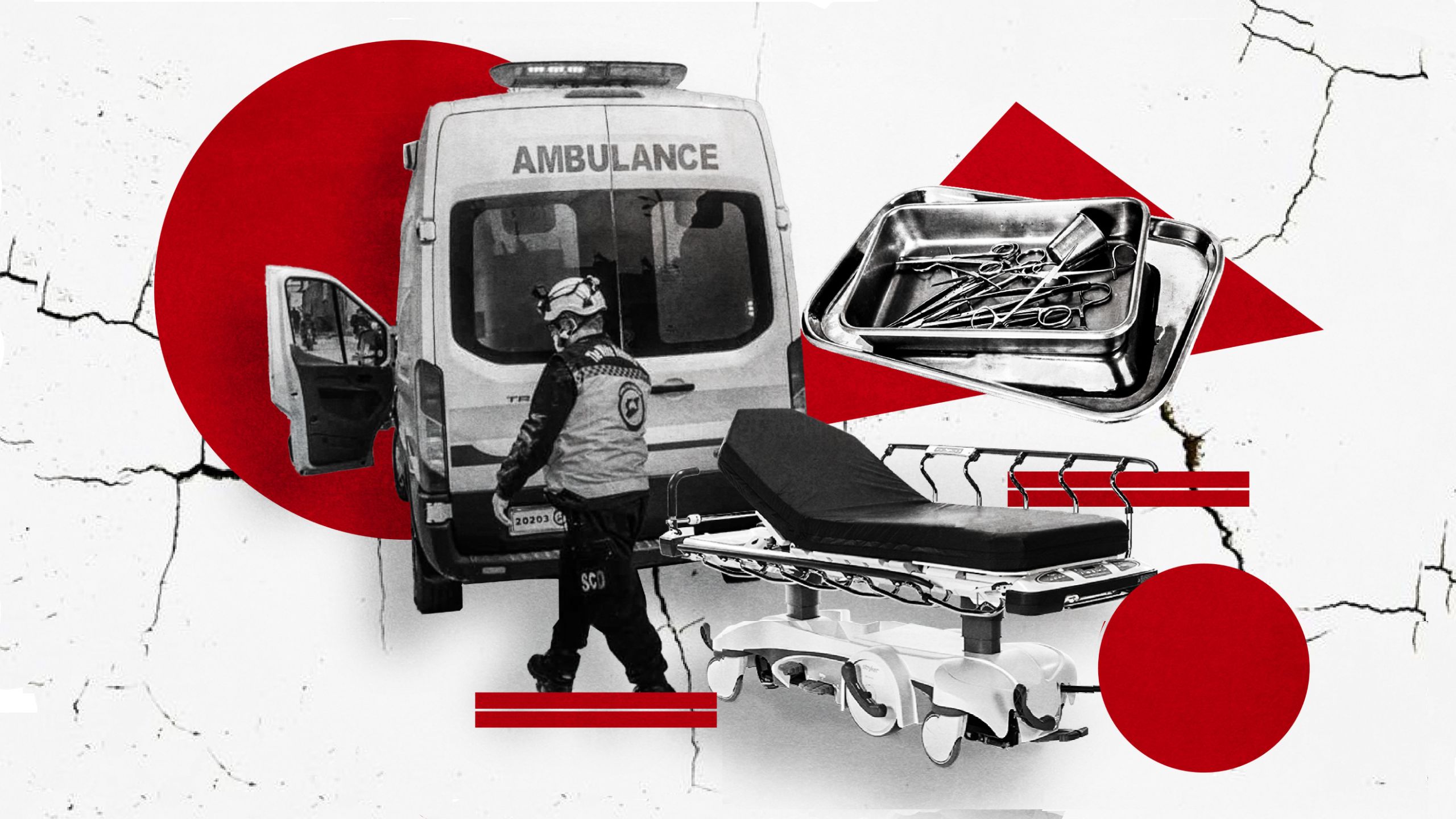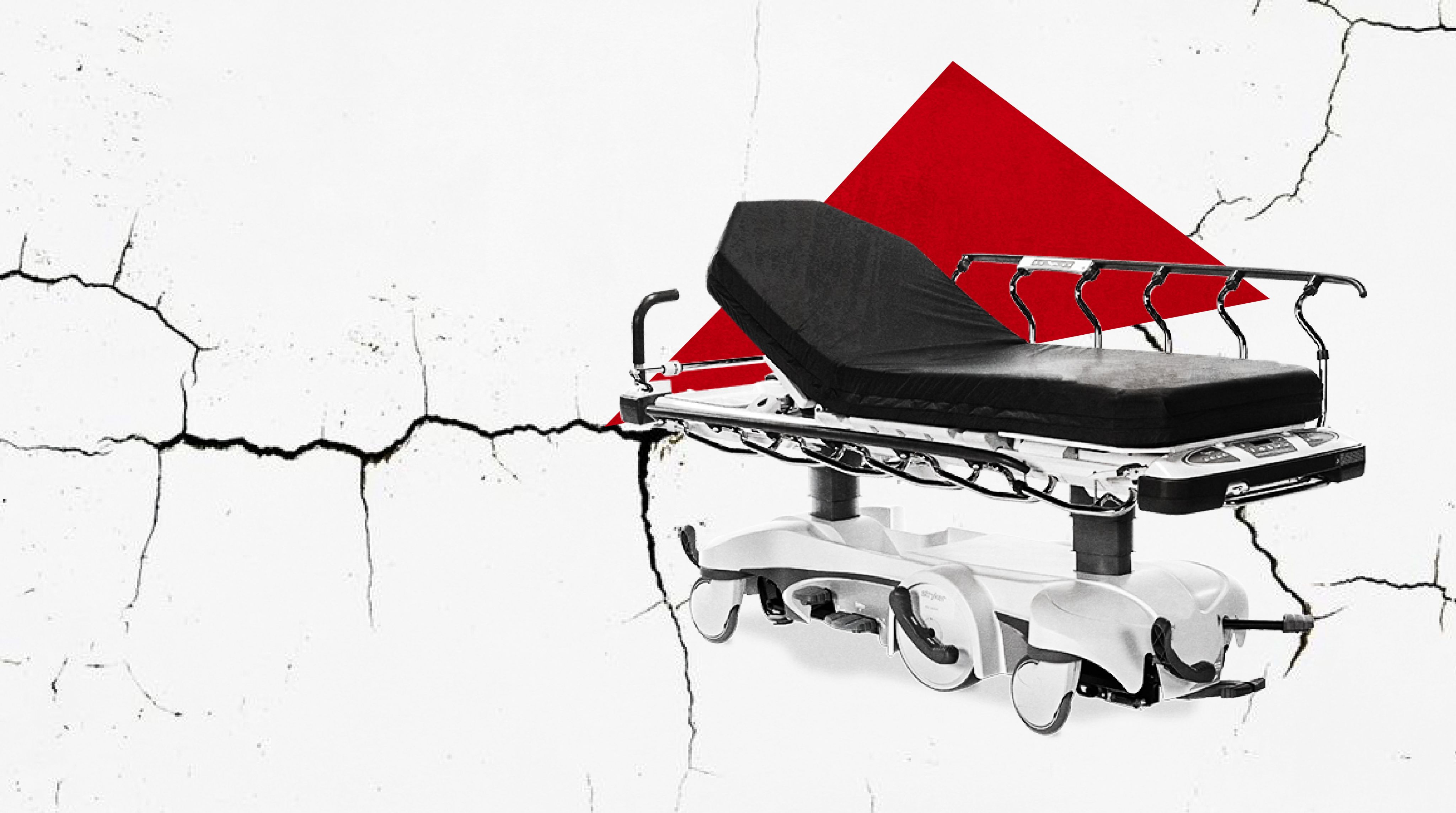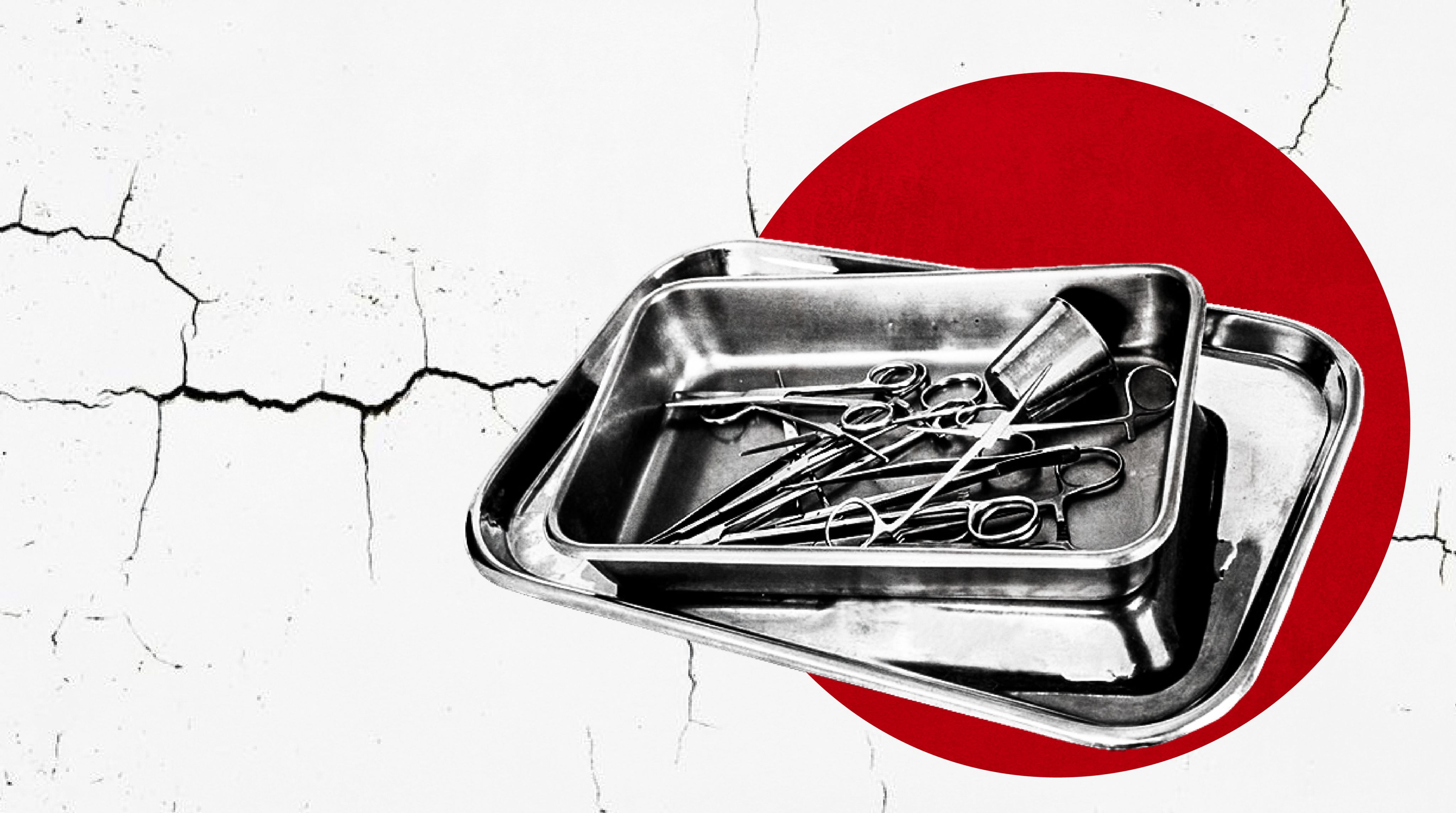
A month after the catastrophe; the earthquake accelerates the collapse of the medical sector in northwestern Syria
Manar Abdulrazak
The dilapidated health infrastructure in northwestern Syria was strapped from the ability to respond to the earthquake; The medical system was already suffering scarce resources, reduced supplies and support offered to the medical institutions, and laid off staff; what made the situation more disastrous.
"We couldn’t secure enough places in the intensive care rooms by the first hours of the earthquake...the referral system used within the ambulance system in the region was literally collapsed," this is how Doctor Ahmed Berro, the ambulance system official at Syria Relief and Development Organization, described the first hours of the earthquake situation.
The medical sector in northern Syria faced the disaster of the earthquake that struck the region at the dawn of Monday, February 6th, 2023; leaving more than 2,274 dead and 12,000 injured, according to statistics provided by Syria Civil Defense (White Helmets).
Dr Berro added: “The situation was tragic; Unfortunately, some people lost their lives due to contusions caused by the falling rubble, and lack of accurate diagnosis of their conditions during the ambulance operations, or longer waiting periods for treatment provision.”
The referral system in northern Syrian hospitals coordinates between the ambulance system, after assessing patients’ conditions and referral coordinators in hospitals.
Referral coordinators work on securing intensive care rooms for patients with serious injuries in Idlib and Afrin hospitals. coordinators were able to transfer about 330 injured people; During the first two days of the earthquake; having the ambulance system in the area supplied with 24 ambulance vehicles dedicated to transporting injured people to the specialized hospitals.
A little girl's body, lying on the emergency table in the hospital without burial for the third day in a row.

Chaos and Forgotten Corpses
A little girl's body, lying on the emergency table in the hospital without burial for the third day in a row. Dr. Berro found it during one of his field trips at Jindires Hospital.
Berro added: “The little girl's body was not alone; it was lying next to about ten other bodies, covered with some 'blankets or sheets' on the first day of the earthquake; But the work pressure led to the obliviousness of the dead girl without burial.
Upon workers' cognizance of the corpse; they documented it in the military hospital records in Afrin, which is responsible for taking pictures of the unidentified decedents and burying their bodies in certain cemeteries. The chaos consequent to the tremendous pressure on the medical sector facilities led to making some improvised decisions; in terms of documenting the victims before burying them.
The huge pressure on the medical sector facilities and casualty figures lead to forgetting numbers of corpses in the emergency departments of hospitals, and to leaving some unburied for several days; waiting for a "grave digger" to save the dead bodies of the earthquake from rotting.
Rozana documented one of these cases; In which the local council of Jindires buried 12 bodies of earthquake victims without documentation; The incident sparked condemnation from a number of organizations and activists in the region; and necessitated a process of documenting the location of the cemetery.
The impact of the disaster was doubled on the medical staff at Bab Al-Hawa Hospital; as was the case with most medical facilities that provided health care to the injured, despite staff loss of some of their families, and the search for the fate of others under the rubble. One of the staff is Dr. Muhammad Hamra, the administrative director of Bab Al-Hawa Hospital; who lost his wife and infant child during the earthquake that struck the city of Antakya; While his two daughters managed to survive after digging through the rubble with their bare hands.
Earthquake victims have the priority
Hospitals had to respond to the earthquake casualties at the expense of providing primary health care to patients. This was acknowledged by Dr. Mohib Kaddour, the Director of Atme Charitable Hospital; that the urgent need to respond to the earthquake victims was what motivated all health workers to respond to them, at the expense of cold cases. Consequently, primary health care was absent in most northern hospitals during the first days of the disaster.
The main difficulty that faced the ambulance system was to determine the quality of referral for earthquake survivors; those with generalized bruises and inaccurate diagnoses. “This made it difficult to assess the situation; and referring cases to designated hospitals”; explained the official in charge of the ambulance system.
The system official added: "The adopted pre-disaster referral system has collapsed, and the current reliance is on case evaluation by the hospital itself. Precedingly, the basis for distributing the injured to hospitals is the field handling of cases; that’s because of intensive care rooms full occupancy at all hospitals, and the accumulation of patients in their corridors".
Ambulances were equipped with comprehensive medical staff, to provide first aid to the injured until reaching the hospital. Dr. Berro confirmed; "The ambulance system recorded only one death during a transfer that took place from Harem Hospital to Bab Al-Hawa Hospital; because of heart arrest".
Despite the reality of deteriorating support, the lack of supplies, and the injuries among the medical personnel; hospitals in northwestern Syria: "were able to receive more than 12,000 injuries, during the response operations for those affected by the earthquake in the first hours and days following the disaster. Injuries varied between major surgery, crushing, amputation of limbs, and multiple bruises”.
The director of health in Idlib, Zuhair Karrat, told Rozana: "The seismic damage affected the medical facilities; the maternity hospital in al-Dana went out of service, and the directorate spotted cracks in 9 affiliated hospitals, some hospitals were partially damaged, including al-Iman hospital in Sarmada".
As a consequence of the disaster; northern hospitals received a number of cases dozens of times its capacity. Dr. Muhammad Hamra, the administrative director of Bab Al-Hawa Hospital communicated to Rozana receival of 1,300 injured, performing about 100 surgeries, Including 53 vertebral fixation operations.
Critical Cases Denied entry to Turkey exacerbates the situation
The February 6th earthquake hit southern Turkish states; the government declared them as disaster areas subsequently; the number of victims rose to more than 150,000 people, including nearly 46 dead. Turkish authorities denied entry of the injured from Syria to its hospitals; as the hospitals' rooms are fully occupied by earthquake patients; This caused many injured people in northern Syria to die as result of health care shortage.
Refusal of entry was confirmed to Rozana by Bab Al-Hawa checkpoint health office official: "From the first day, the Turkish side informed us by suspending the entry of patients until further notice", and that "300 emergency cases and 450 cold cases were crossing borders monthly before the earthquake".
Dr. Mohib Kaddour, the Director of Atme Charitable Hospital, described the day of the earthquake as "terrifying", in terms of cases' numbers and their medical conditions. He told us that: "The quake being happened at dawn; Contributed to the increase in the number of injured", and that: "the condition of large number of the wounded was very serious and worrisome, especially since most of them were suffering from the crush syndrome; limbs amputation, in addition to the progression of critical injuries into deaths".
He also called on all individuals and governments sympathetic to northwestern Syrians to work on establishing an air bridge, especially after allocating a field airport at the Bab al-Hawa border crossing, to transfer complex critical cases to developed countries for treatment provision.
Medical facilities damaged by the earthquake
Medical institutions inside Syria were not spared from the earthquake, according to a statement issued by the World Health Organization on February 22nd: "seven hospitals and about 145 health facilities were damaged in Syria as a result of the earthquake, many of them in northwestern Syria; which had been destroyed by the war in Syria over last decade; making it more vulnerable to shocks”
The international organization has delivered four chartered planes carrying aid to Syria; with heavy equipment to be delivered soon, according to the organization's regional emergency director: Richard Brennan. He also mentioned that the World Health Organization had a long presence in northwestern Syria supplying 30% of medicines consumption, having their distribution monitored by a third party.
He explained that the current major problems are the probability of cholera outbreaks, the overcrowding of shelters, and the vulnerability of sanitation services; which may increase the transmission of diseases. He pointed out that the organization will deliver cholera vaccines to the most vulnerable groups by the end of next March.
Expired medicines.. to overcome the disaster
The lack of specialized medical staff prompted some doctors to issue appeals to Syrian doctors residing in Germany and holding its nationality. As a result, they came to Syria and participated in several surgeries for earthquake victims. Their specialties varied between orthopedics, neurosurgery, spine and general surgery.
The second major problem was the unavailability of medicine. Doctor Abd al-Salam Dwaihi described the medicines status as “tragic”; explaining that those in charge of the health sector are forced to give out expired drugs to overcome the disaster, and that "the requirements of the health sector are enormous; foremost of which are medical devices and medical consumables, such as: gauze, sterilization materials, surgical tools, medical sutures, and medicines".
He also stated that he has obtained "full lists of needs, in order to try to secure at least some of them from active organizations in the medical field in Germany", while Dwaihi published on his page about preparations for the distribution of 3,000 food baskets for earthquake victims, with an estimated cost of about 53,000 euros.
Dr. Ahmad Mansour, director of medical operations in Syria of Yadan b'Yad (Hand in Hand) organization, said that the needs of the health sector in the north are "huge", telling Rozana that the most important needed hospital supplies are "orthopedic and general surgery supplies, anesthesia medications, dialysis devices and kits".
Mansour stressed on that the disaster was scaled as major during the past days and weeks, and that the medical facilities supervised by the organization (5 hospitals and 5 dispensaries) have received hundreds of the earthquake injuries; resulted in more than 300 deaths out of a total of about 2274 cases throughout the region.

Before the Earthquake.. Health sector exhaustion and subsidies reduction
Donors reduced funding for the medical sector in northwestern Syria; and medical bodies operating in the north sounded the alarm, weeks before the earthquake. These entities laid off some of their staff and closed several hospitals in response to the announcements of reducing international support for the health sector by approximately 30%; causing cut of some previously provided medical services and mounting fear of the spread of cholera since October 2022.
Intersecting sources in the organizations working in the health sector told Rozana that the reduction of subsidies before the earthquake led to the dismissal of approximately 20% of workers in the health sector, and caused large number of medical facilities either to close entirely or at least forced to close some of their departments.
An official director belongs to Yadan b'Yad organization, who preferred not to be named, told Rozana that "the organization had to lay off about 150 workers in the medical sector they manage, out of 1,000 working for the organization in its various facilities". He further stated that "the organization halted one of Its hospitals before the earthquake, resuming it back to operate through Ensaf (equity) grant afforded after the earthquake had occurred.
All medical institutions in northern Syria depend on aid projects to finance their basic needs of personnel and supplies; as the average monthly amounts provided by humanitarian and international organizations is about $3 million. Aid projects are conducted as semi-annual contracts; as they are linked to the Security Council resolutions regarding cross-border aid access to Syria.
The sources also stressed on the absence of integrated medical services, especially during the hospitalization period; as hospitals were obliged to suspend their kitchens and lay off those in charge of them; depriving the patient of meals during the treatment and hospitalization periods.
Idlib University Hospital is the only hospital outside the organizations' support system; Its expenditures get covered by the revenues of the Bab al-Hawa border checkpoint according to a 4 year-long partnership contract between the two sides.
The health sector suffers the reduction of contributed subsidies and the obsolescence of medical devices that have been consumed over the past 12 years; as most of the medical facilities were established as ambulatory field hospitals during the war, then developed into public health care system serving its regions.
The workers in the health sector found themselves facing multiple challenges, including the emigration of medical personnel and the absence of vocational educational institutions. What multiplied the burdens was receiving tens of thousands of displaced people from other regions (Daraa, Damascus countryside, Ghouta, Qalamoun, and Aleppo), without equivalent medical human resources coverage.
Dr. Mohib Kaddour, the Director of Atme Charitable Hospital, expressed the case saying: "The situation was very bad before the earthquake, and even before the revolution the region was very marginalized; health services were concentrated in Aleppo and Damascus". He continued: "The field hospitals were established in response to the emergent situation, then developed into health network system; health directorate and doctors syndicate; we created a somewhat medical governance system".
He also indicated that among the reasons that led to the deterioration of the health sector was: "the migration of medical personnel who were displaced from separate regions of Syria, and thus northern Syria received displaced people without comparable medical personnel. Added to that the burden of communicable diseases that skyrocketed by Corona pandemic; causing shocks to the health sector that was formed on the basis of crisis management; to alleviate bombing consequences; but not communicable diseases management"
He also said: "The health sector suffered in governing these bodies; conflict of interests between the old and the new authorities, and among supporting organizations; each of which could have had a point of view in the mechanism of providing support, and thus the health sector entered the state of non-exclusive responsibility in providing medical services.
It also seems that the Russian-Ukrainian war is one of the reasons of support reduction: many European countries have modified their priorities into supporting Ukraine. Added to that the multiplicity of de facto forces that have taken control of the region, the latest of which was " Hay'at al-Sham "; This led to reluctance of some countries to support the health sector, including Saudi Arabia, Kuwait and some other countries. Corona epidemic has also affected the systems of the supporting countries. The UAE wasn't initially enthusiastic about supporting areas outside the regime's control.
The UN also cut subsidies by almost 30%; that’s because of emerging of new markets for charitable work; This led to the closure of a number of medical facilities and dismissal of some of their employees, according to Dr. Kaddour.


Northern Aleppo Countryside Hospitals, between the Turks and the organizations
In the northern countryside of Aleppo, there are two types of medical facilities. The first is known among the population as "Turkish hospitals"; they are run in cooperation between the local councils and the Turkish Ministry of Health; attributed to the central hospital of the nearest state.
These hospitals include: " Marea, Al-Bab, Azaz, Sajo, Al-Rai, Jarabulus and Afrin", and contain approximately 805 beds. They are run by two doctors, one of them is Syrian and the other is Turkish; who have the authority for making decisions. These hospitals are well equipped with supplies; However, the drawbacks are high patients/ staff ratio, and high variability of salaries and wages between Syrian and Turkish employees; for instance: Turkish doctor’s premium is double his Syrian counterpart.
As for the second type of medical facilities is affiliated to the Ministry of Health in the Syrian Interim Government and managed by the Directorate of Health in cooperation with active organizations in the medical field. These facilities' capacity is about 400 beds, with a similar situation to the reality in Idlib countryside; as they have received, in addition to Afrin Hospital, a large number of earthquake-affected people and provided them with the required medical and emergency care.
The director of emergency stated that: "the organization has requested more medical supplies, but it also needs vital equipment; such as X-rays and computerized axial tomography scan devices". Medical sources told Rozana that the health sector needs a process of renewal of its infrastructure and devices that were exhausted by extensive usage during the war.
According to a number of actors in the medical field, there are promises made by some former supporters of the medical sector to reconsider the reduced value of funding and to provide aid during the upcoming period.
And until these promises find their way to implementation, away from the administrative bureaucracy, and until the possibility of fulfilling them is explored; it was officially announced that two people died after contracting cholera, according to what was announced by the Early Warning and Epidemiological Response Network, as the vaccine was supposed to be distributed before the 8th of March.
This means a new challenge for the medical sector in northwest Syria, and that its suffering will double during the recovery period following the earthquake. Added to that some external complications related to the political realm, as the provision of aid across borders is linked to the UN mandate; which is often subject to Russian blackmail, regional and international changes. This means that the next stage will be more ambiguous considering the Arab rapprochement with the Syrian regime and the change in the Turkish approach with the file. This raises several questions about the future of support for the medical sector, and the extent to which it depends on these variables.
